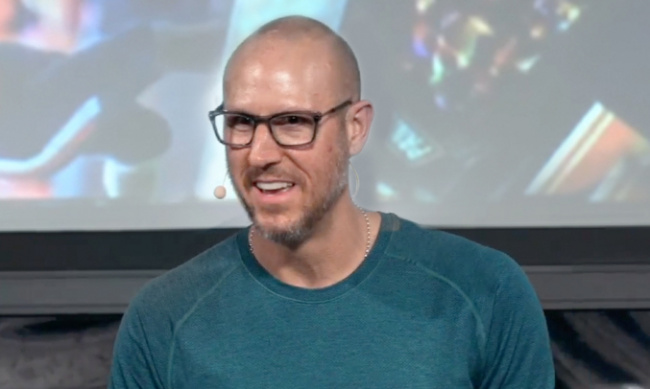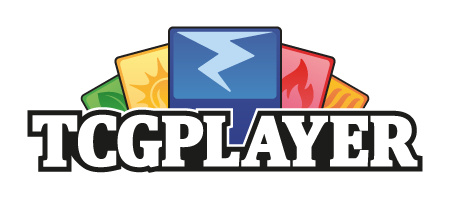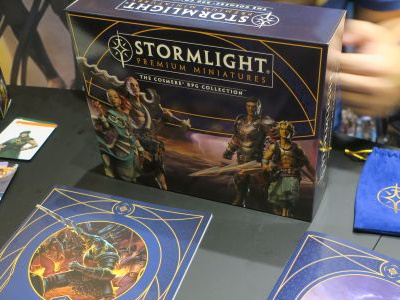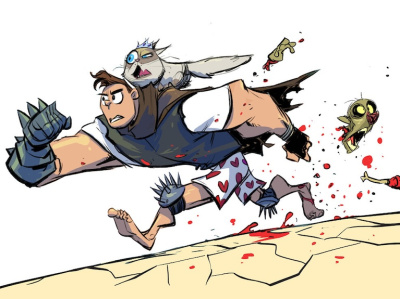In Business 3x3, a business retailer or executive will share their experience with three things they’ve done right, three things they’ve done wrong, and what else they’ve learned along the way.
Chedy Hampson used to sell a few cards here and there. Now he’s selling about 100 million a year.
Hampson is the founder and CEO of TCGplayer.com, a massive online marketplace for TCGs, and soon to expand into other categories. Hampson managed sports card/comic/game stores in Syracuse, New York, when he got the idea to start an ecommerce website.
"We’re talking 20 years ago, so that was quite in the Internet infancy days," Hampson remembers. "We started by learning how to build websites for the first databases for Pokémon and Magic: The Gathering. And those websites that we thought were just test websites got the first advertising dollars from Pokémon USA, Wizards of the Coast and so on. It turned out that what we were working on as a test subject turned out to be the real potential."
TCGplayer sells both its own product, and also allows other stores and collectors to buy and sell on its platform. It’s the major hub for buying and selling collectible card game singles and other product.
Hampson has stayed rooted in Syracuse, and its time, TCGplayer has grown from 10 employees wedged into Hampson’s dining room and living room to over 600 employees in a massive complex. The result? Yeah, about 100 million products shipped per year.
"We’ve been very focused on how people buy collectibles," Hampson says. "We look at how people, stores across the country, put together shopping carts. I think we’re on the cusp of solving that problem like nobody else, which is why you see so many products selling on our platform."
And it’s not just the product. It’s people as well, as you’ll see in what Hampson has learned.
THE GOOD
HIRE FOR WHERE YOU’RE GOING
Going from 10 employees to 600 employees is a big—and gradual—lift. But Hampson thinks you have to look at your eventual goal.
"The challenge of a business owner is to avoid the trap of being too busy," he says. "Obviously, you want immediate help. You want someone to get the job that’s right in front of you done. But what I’ve learned after 20 years of doing this, especially if you’re trying to grow the business, is that you need to find the kind of person who’s going to help you get done what you need in the future, or you’ll be right back in the same position. Your hiring philosophy has to be about finding people who will help you with the future work, and that will still help you with the current work."
Hampson knows well the scalability issue. His is now a large company, but he talks to smaller, brick-and-mortar operations regularly.
"When I talk to retailers, they’ll say, 'Well, I see how that’s important for you because you’re big. But we’re small, only eight people,'" Hampson says. "I’ll challenge them and tell them it’s probably even more important for them by scale of what that one hire’s impact will be and mean for the rest of their team. You have to be thinking, especially if you want to open a second store or add new product lines, about finding new people, making them leaders, picking up their new skills that will work for you. The hiring is so much more important the smaller the business."
INSTILL COMPANY VALUES
It’s more than just a poster on the wall. Five "core values" are an important part of how Hampson runs TCGPlayer, and those values are available for anyone to see on the company’s website.
"No matter what the size of your company, the first moment you can, instill those company values," Hampson says. "I think we did it when we were about 10 employees, and it was a multi-month project to have all the employees pitch in to decide what the values were that would drive our work, how we wanted to interact with our community."
Hampson sees tremendous value in those multi-months.
"Those values have allowed us to move fast and scale," he says. "Because not only do you get to hire against them, and understand that the people that you bring on to our team are going to understand and operate the way you want them to, but they also allow you to make the right decisions as you interact with your customers and business partners. You don’t have to figure out how you’re going to respond each and every time, you just point to your values and go, 'Huh. We believe in this, so this is how we should respond.'"
Hampson knows some people may find the notion a tad hippy-dippy. But he’s a believer.
"This is a must-need," he says. "It’s not just 'hire great people,' but make sure your values align to how you want to point in the world. Layered together, it allows you to recruit and hire better people. It makes your job easier."
BE A COMMUNITY PARTNER
TCGplayer is big, but Hampson is well aware that the world is bigger than big.
"You’ve got to lift your head up and not just focus on your store, but on the larger ecosystem," Hampson says. "Make sure you’re a good part of a broader network to be successful."
Hampson has found success in partnering up with retailers worldwide, and with the city of Syracuse.
"They reached out to us as we were starting to help us learn marketing, get better with technology, become part of a tech hub, recruit people to come here," Hampson says.
And again, Hampson thinks this macro- point applies, regardless of scale.
"Every local gaming store has both their local community, and an online community," he says. "Both of those provide a chance to reach out, connect, get a bigger purpose, get new insights, see roadblocks that might be coming for your business before you get there."
THE BAD
MAKE SURE TO TURN DOWN THE WRONG OPPORTUNITY
Growing your business is one thing. But Hampson suggests you should always play to your strengths.
"Stay focused on just a few things, and do them well," he says. "We’re a technology company; we’re innovative, high growth, and what we’ve learned repeatedly is that with so many opportunities in front of us, it can be just as valuable to say 'no' to a lot of things so you can have a huge impact in the things you’re already doing well."
And yes, Hampson thinks "go with what you know" boils down to street level as well.
"It’s important to brick-and-mortar," he says. "Do you want to add two or three more product lines? Add organized play? Ask yourself what it’s going to get you. You might do better to just hyper-focus on what you’re already doing the most, and be absolutely successful at that. You might have more upside keeping your eye on the ball."
NEVER DRIFT AWAY FROM THE CUSTOMER
It’s easy to fall in love with technology, or what will add 2% to the bottom line. But Hampson thinks that customer need is always the path to follow.
"Make sure that the customer and the feedback you’re receiving leads your business," he says. "It can’t just be revenue. It has to be the customer, and what they’re looking for. Finding a way to understand that is crucial."
And as your business grows, Hampson cautions that you don’t always have to be chief cook and bottle-washer.
"The store owner can no longer be the no. 1 person who’s most knowledgeable and understands everything and interacts with everyone," he says. "Over the last year and a half, we’ve hired a chief product officer, chief marketing officer, VP of customer service, chief supply chain officer and each one of these people understands customers and processes for getting feedback back perfectly. They are the new ‘me’s for this company. What I need from them is because I can no longer be everywhere all the time, they need to get feedback back to me so we can make decisions based on what the customer is telling us so we don’t lose our way."
DON’T TRY TO FILL EVERY ROLE
With a bigger staff, Hampson is learning how to take care of himself, which also takes care of his business.
"The last few years, a 60-hour week would be a minimal week," he says. "But if you have to be the guy filling in on every role every time there’s a fire, this leaves you, as a business owner, always putting out fires."
Hampson is learning to let go, and draw some important lines.
"There’s going to be moments where you have to hire a team around you, and set up boundaries around yourself to take care of yourself," he says. "Otherwise, you are not strategic anymore. You will turn into a negative for your business."
And part of it is, yeah… self-care.
"I’ve been focused on staying fit, meditation, eating right," Hampson says. "All these things mean I can walk into meetings, take calls from retailers to hear what they’re thinking, strategize. If I tried to be a superhero all the time, I’d never have time to do that. It feels selfish to take care of yourself when you think about your time and what you could do for your business, but it’s the most important thing to do to preserve yourself for your business."
AND WHAT ELSE?
"Store owners are often the smartest people in the room. They’re fearful when margins are tight and they know they can’t afford a single miss."
"Everything we talked about here, I think it all rolls up to the talent you surround yourself with, the people you’re hiring. It’s critical."
"Don’t be afraid to bring on a candidate who might be beyond what you need, might even be beyond your pay scale. I wasn’t the most creative person at our company for a few years because I wasn’t bringing in the best talent I could each time I needed it. Great people make a great company. It’s cliché, but it’s the truth."
"I think a lot of people drift away when they don’t interact with their customer any longer. They don’t have their finger on the pulse. But it doesn’t have to be you who has your finger on the pulse. It can be your team."

'Avoid the Trap of Being Too Busy'
Posted by Jim McLauchlin on June 16, 2022 @ 2:26 am CT
MORE GAMES
In 'Dracula vs. Hitler'; New RPG Just Unveiled by Devir Games
August 1, 2025
Devir Games unveiled Dracula vs. Hitler , a new RPG, that will be heading to BackerKit.
For 'Cosmere RPG'
August 1, 2025
Brotherwise Games previewed their Stormlight Premium Miniatures Collection , for Cosmere RPG .
MORE NEWS
Part of 1996 Marvel/DC Crossover
August 1, 2025
Writer Karl Kesel and artist Mike Wieringo are the creative team for the one-shot comic, which was first published in 1996 in the middle of a Marvel/DC crossover.
Crowdfunding Campaign Launches in October, Followed by Retail Release
August 1, 2025
Vault will crowdfund the graphic novel on the Backerkit platform in October, then release it to retail.









